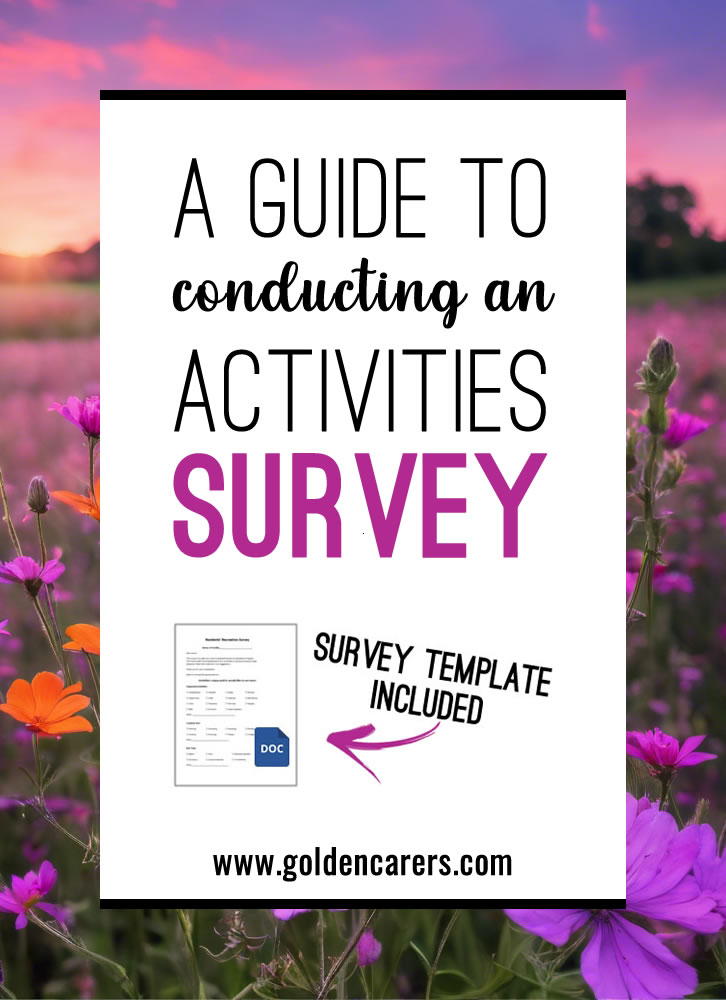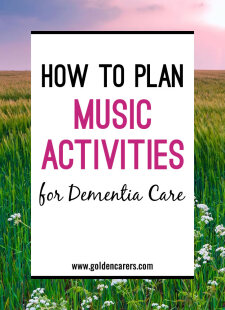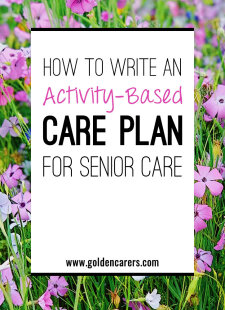How to Conduct an Activities Survey

Activity programs are a cornerstone of quality care in long-term care homes. These programs offer opportunities for residents to connect, stay active, and enjoy fulfilling experiences each day.
For prospective residents and their families, the quality of an activities program is a key consideration, alongside the facility's environment, services, living spaces, and the well-being of current residents.
Addressing Lack of Engagement
One common challenge for Activity Coordinators is the lack of engagement among residents. This issue may stem from:
Habitual Participation: Some residents may attend activities out of routine rather than genuine interest.
Social Gathering: Residents may congregate in recreation areas simply because it's a social hub, not necessarily because they are enthusiastic about the activities.
Boredom: A lack of interest in current activities, even if residents don’t openly express dissatisfaction.
Activity Imbalance: Overemphasis on certain types of activities can lead to a decline in interest in others.
Lack of Enthusiasm: Insufficient energy or passion from staff leading the activities.
Behavioral Factors: Conditions like apathy impacting participation.
The Power of Surveys
Conducting regular surveys is an effective way to address engagement challenges and tailor your activities program to residents' preferences. To assist with this, we’ve included two printable survey templates in Word format:
Activity Program Survey: A concise tool for gathering quick feedback on current programs.
Resident Lifestyle Survey: A detailed questionnaire exploring various aspects of residents' interests, histories, and preferences.
These surveys are ready for customization and easy distribution, helping you gather meaningful insights to improve your activities program.
Tips for Optimizing Your Survey Process
Self-Reflection: Review your current activities before creating the survey to ensure alignment with resident needs.
Resident Involvement: Encourage residents to participate. Family members can assist if needed.
Survey Distribution: Use multiple channels, such as printed forms, online submissions, or facility newsletters.
Anonymity: Offer the option to respond anonymously for honest feedback.
Feedback Analysis: Look for patterns and actionable insights in the survey results.
Action Plan: Develop and implement a strategy based on the feedback. Include new activities and adjustments to reflect residents’ preferences.
Continuous Improvement: Repeat the survey process regularly and adapt programs accordingly.
Resident Input is Key
Engaging residents in shaping their activity programs is one of the most effective ways to create a vibrant and fulfilling environment. Surveys provide a direct line to their needs and preferences, empowering you to make informed decisions that improve their quality of life.
Have you conducted a survey before? If so, what insights did you gather, and how did it impact your program? If not, there’s no better time to start. A small effort today can lead to a big transformation in how your activities program resonates with your residents.






Antoinnette
Can be difficult to get everyone involved
It is great that you are thinking of all your residents
First you need to know what the residents like to do and what they are capable of doing
I like to do one to one within a group or a mixed group
This article will be a big help to you
https://www.goldencarers.com/how-to-support-mentally-alert-clients-in-mixed-group-environments/4992/
I also like music activities for a mixed group
https://www.goldencarers.com/music/
Here are some more things to try
ave you tried these
https://www.goldencarers.com/dementia/
https://www.goldencarers.com/reminiscing-activities-for-seniors/3184/
https://www.goldencarers.com/sensory-stimulation-for-dementia-care/4184/
https://www.goldencarers.com/20-practical-activities-for-people-living-with-alzheimers-disease/3778/
If so, do you need help adapting and modifying them to your particular group?
Here are some other ideas
I always had one to one interactions within a group activity. With such a diverse group, it is hard to have everyone participate unless you
walk around the group making eye contact so you get each person's attention
address each person by name
have an activity that most everyone can participate in like a sing along
but what I usually do is play name that tune and here is how
After the group is assembled, make sure to greet everyone. Tell your audience how happy you are that they are there. Greet each person by name. Remember you need to be enthusiastic about what you are doing
Now you are ready to start the activity
Instead of playing one or two notes or playing the game like hangman, (You could play these ways as well), you say the first word of the song title. See if anyone can finish the title. If not, say the second word of the title and so on until someone gets the title. If they are having a hard time, give other hints. To allow the meek resident a chance, ask the other members in the group to give the meek person a chance to name the song. Even if someone else shouts out the title, still ask the shy individual to say the title of the song. Be extremely complimentary to this person, as well, to boost his/her confidence.
After the song title is guessed, ask, who can sing it. Sometimes we only sing the first line. Sometimes we butcher the song, but then we have a good laugh.
Continue playing the game in this manner, singing the familiar songs, or singing them with a CD, for the allotted time period. I usually do it for about an hour
Throw in a little trivia if there is a lull in the action. For example, if the song is about summer, I ask the participants to tell me their favorite season and why they like that season. I always tell the story of how I hate winter.
If they are nonverbal, you can say the answer for them. However before saying the title, say, I can tell by (name of participant)’s smile that she thinks the title is (whatever the song title is). or you can ask a higher functioning resident what he thinks the non verbal resident is thinking
Then you might want to gently squeeze this person’s hand or give him/her a hug
I just go with the flow. Thus, the group is different every time.
Another good game is a dice game called one
We have played a similar game using just one die.
Each person gets a turn rolling the die until he gets a one or chooses to stop
We add up the numbers rolled each person gets
If you want to have a winner, the one with the most points at the end of the round wins.
What is so good about this game is, that it is good for a group with mixed mental and physical abilities. You can have some group members help other group members.
It is great as a long or short activity
Hi! I'm an activities lead on my nursing homes dementia unit. I am brand new to this department as I was doing CNA Work but felt so burned out, I needed the switch. My problem is how do I get all levels of dementia to interact and engage in an activity? I am at risk of loosing my position because I was told I am not getting everyone engaged in an activity. I am responsible for 43 Residents with dementia levels from beginning to near end stage. I am not a musically talented person and each time I set up stations some of my Residents "shop" the equipment and the tables are bare. I do crafts and a weekly tea party. Along with bowling and balloon toss. Friday is movie day and manicures. Any advice is greatly appreciated.
Antoinette
I am new to my 55+ community and am the new event chairperson.
Not many people have participated in events so this survey will be a great help to get their input.
Thank you.
Hi Catherine
Have you thought about having a resident council meeting where Activities they want to do the primary topic
Giving them a choice of two or three items usually is good
You are so may want to do one to one especially with the student not usually participate
Here are some ideas how to get residence to participate
https://www.goldencarers.com/search/?search_tag=Forum&search=Reluctant%20residence
Hi Aysheya
It is a good idea to do the survey before starting activities to see what your residents are thinking
This really helped me today. Since we are reopening soon because we have all been vaccinated. I am getting a sense of my residents.
Love all the ideas if I run out I can always count on you thank you
Hi Jan
Thank you for your kind words
I would love to see this survey, however do not have word available to me, we only have google docs. is there any way you could send it to me for google docs?
I can not figure how to make this a google doc or PDF, would anyone have that? Could you emial it to me?
Hi Sherry, you should be able to open a word doc in google docs. Just open your google drive and click New and then select File Upload and select the word doc. That should do the trick!
Hi Brenda
Here is an activity evaluation form
https://www.goldencarers.com/activity-evaluation-form/5165/
Thank you so much for providing this helpful tool. I also would like to request a copy of your annual survey.
This is a wonderful tool!
Thank you,
Brenda
Hello everyone. Our organization recently provided our clients to a water amusement park trip. I was asked to develop a questionnaire for the clients to fill out about their experience on the trip. I’m drawing a blank on question to ask. Can someone please give some ideas?
Thank in advance
Hi Rosa
Ask about what they enjoyed about planning the trip
The bus ride or transportation over there to the park
Their favorite activities at the park
The fun they had with their friends
Did they meet new friends
Did they have anything to eat what was their favorite
Did they see any children
What did they think the children were doing and what did the children have fun doing
I am sure if you think about the trip and each part of it that you can figure out more questions to ask if this is not enough
Let me know if you need more help
I likely to understanding this work well.
Thanks..
Thanks Thomas
I would love a copy of the Activity Survey but need it in a PDF form. Is that possible?
Hi Doreen, it is provided as a word document so that you can edit it to include your facility name and any specific questions you would like to include.
You can open the word document and make any changes you require and then save it as a pdf document. (File > Save As > and then select type 'pdf').
Let me know if you have any questions!
What survey do you use to have the patients in a Swing Bed setting, evaluate how I am doing with the Activities program? I'd also like feedback from staff to get their ideas.
Thanks so much! Karen in Sitka, Alaska
Just joined 2 days ago. I am loving all the information. Just recently took over the activities department at the facility I work for so I will take any advice and help I can get.
Congratulations on your new position Valarie, and all the very best! You will find a lot of resources you can use here and lots of support from others if you have any questions. x
So excited to use this survey as the new Activities Director at our facility
Thanks for your feedback Amanda, love to hear how it goes! Congratulations on your new position and all the very best! x
Thank you the feedback survey was very helpful!
I am currently in my fourth week of Activity Therapy On-line course. I absolutely love the surveys provided. I will definitely use these in my Practicum Survey Assignment. Love the fact of an informative and useful ideas get emailed everyday !! Thank You Ma'am !
Would love help
A VERY BIG Thank you to Susan & all who helped with providing the activity/residents survey forms.Both excellent and will be of benefit to our residents and planning of our activities.Much appreciated.Keep up the good work.
thank you!
we are in the process of preparing our annual survey of our respite clients and their carers and these templates have generated further thinking and provided lots more ideas and options.
Much appreciated!
That's so good to hear! Thanks for your feedback Suzie.
Hi
Can someone show me how to record an activity session
Ger
This is great! it gives me lots of ideas and information. Thank you for creating and helping us. Everything are here, I wish it will give us more so we can improve our activities cater for elderly.
Thank you
Thanks so much for your feedback Lalaine
Thank you for that most helpful .
Thanks for your feedback Marsha!
Wow !!!! Big help... Thank you
Thanks for the feedback Mariann!
Thank you Wendy!
Just joined and I am loving, the information is so helpful thank-you.
The Recreation Therapy program (Gerontology) is recently introduced in our facility. Your suggestion of survey and evaluation of programs is on track with offering the best choices in leisure. Our residents and clients deserve the very best activity and recreation choices that we can offer, and the information you have provided today is very useful and helpful.
Thanks Darla!
This is awesome. Thank you so much for refreshing my memory.
Thanks Kirsten!
We do annual surveys of our programs and resident satisfaction survey which includes all aspects of living in care. However i do like the resident lifestyle survey shown here which is placed into the accreditation outcomes too.
Alison,
Could I get a copy of your annual survey for residents? And yes I would include the lifestyle survey it is very good!
Thanks for your feedback Alison.